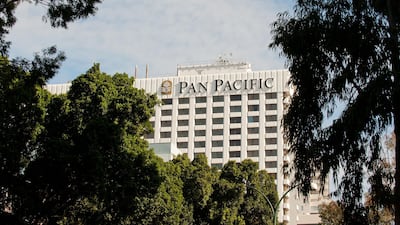A five-star waterfront Perth hotel has taken in 23 people who usually sleep rough and have nowhere else to go in a bid to keep them healthy and safe during the coronavirus pandemic.
Staff at the Pan Pacific Perth saw an opportunity to help the city's "most vulnerable people" as travel bans meant bookings dropped off and rooms lay empty, General Manager Rob Weeden, who lived in Dubai for seven years until 2018, told The National.
“We have 700-1000 people sleeping rough just in the Perth central business district every night and we recognised we could do something meaningful to help,” he said.
Mr Weeden contacted local and state government leaders, who then worked with the state’s Department of Communities and RUAH Community Services, a homelessness non-government organisation, to initiate a pilot program to help the homeless.
The 23 homeless people moved in last week and will live at the Pan Pacific for at least a month.
“This cohort is Perth’s most vulnerable people. We have Indigenous people aged over 40, non-Indigenous people over 50, all of them have an illness, diabetes, heart disease… they represent the most vulnerable of the vulnerable in our city,” Mr Weeden said.
He told The National about an Indigenous man in his 50s who has become the unofficial artist in residence at the hotel which, with 500 guest rooms, is the city's largest.
“He arrived and settled in and has just started to do his artwork. He works in the traditional style from the Kimberly region. He was doing a beautiful piece depicting wildflowers meeting, having a fight and fleeing, leaving behind the seeds that grew into a prairie… but he realised he didn’t have enough paint,” Mr Weeden said. “I contacted Linton Partington of Linton & Kay Galleries, and he asked around the arts community and we received a huge box of paints, which will keep this gentleman busy for months.”
Mr Weeden said another guest, a woman who jokes with him about the hotel’s food and suggested he bring her lobster thermidor, has taken big steps in just six days to try and overcome alcohol addiction.
“She is determined she is going to get better,” he said.
The general manager said that the “VIP guests” are now almost half-way through their 14-day mandatory self-isolation, following quarantine guidelines.
“There are nursing and security staff on their level, everyone is well looked after. Some people are transitioning to sleeping in a bed, because they’re used to sleeping on the floor, so it is alien to them… It is a different acclimatisation, for some of the guests – they are adapting to sobriety, and suddenly going cold turkey is not easy… After the 14 days self-isolation, they will be able to mingle in groups of two, get some fresh air. The long-term plan is to get them into housing,” he said.
“After six days we have seen wonderful progress. It is a pilot for a month, to determine if it works for our guests. We have to know it is right for them before it gets rolled out to more people.”
Mr Weeden said that with winter coming to the southern hemisphere there will be an even more urgent need for crisis accommodation. He told The National that the next cohort of guests will include individuals and families left homeless by escaping domestic violence.
“There is a long waitlist but there is a triage process run by Anglicare, Uniting Care West, RUAH, and Homeless Housing are the main bodies,” he said.
Homelessness is a national crisis in Australia, one of the wealthiest countries in the world. The nation’s 2016 census found that 116,000 people in the country were homeless, an increase of 14 per cent on the previous census five years earlier.
Recent figures showed that 40 per cent of the people seeking help from homelessness emergency services in Western Australia were fleeing domestic violence.
In a recent statement, Karyn Walsh AM, chair of the Australian Alliance to End Homelessness, said “Australia is a prosperous country and we should maintain a vision for no one to live on our streets”.
A spokesperson from Western Australia's Department of Communities told The National that the hotel trial period is necessary "because we want to know that it is the best response for this vulnerable cohort, before any decisions are made about scaling it up".
“If the trial is successful, the new service model could be scaled up to support and ensure the safety of people experiencing homelessness and family and domestic violence,” they said.
Mr Weeden said the hotel and its staff were honoured to help the city’s homeless.
“The staff want to work on level ten, where the VIP guests are staying. They feel honoured to do it… These guests are really nice people, and our staff are seeing that with a bit of kindness we can do a lot of good.”

